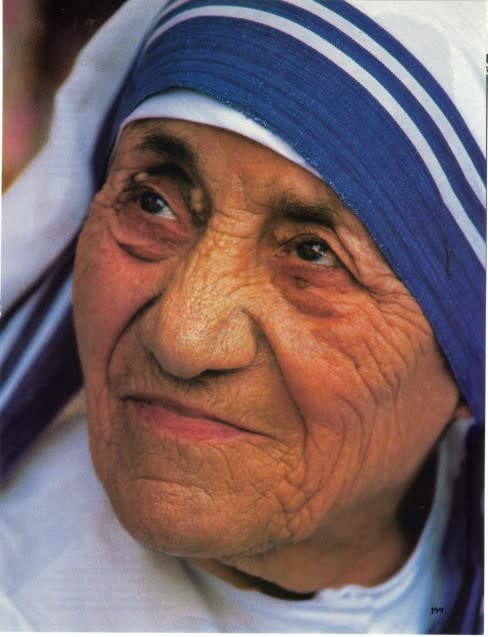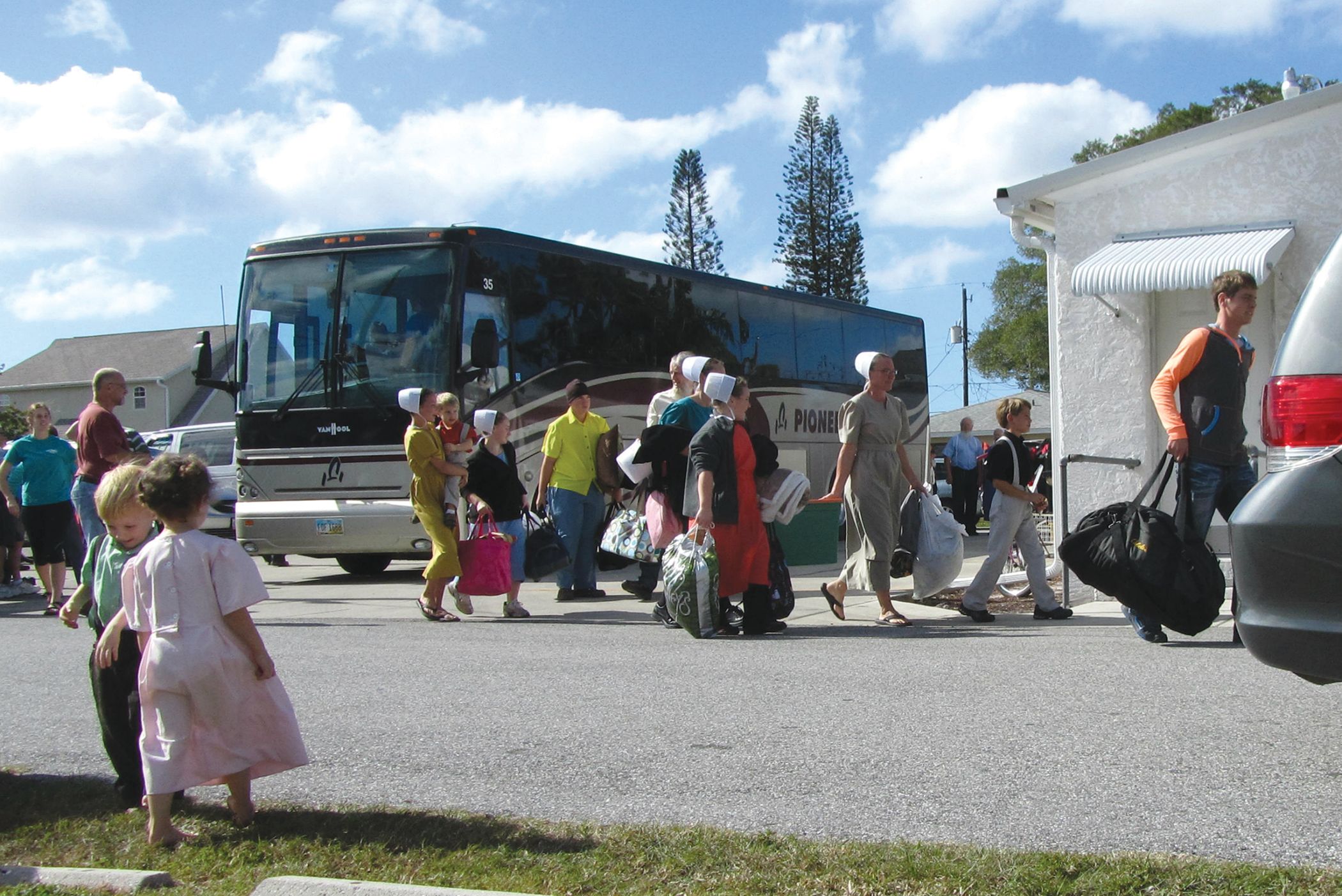Mr. Chatterbox and Mother Teresa

When my mother’s children went off to college, she knew, as did many women back in the 1970s and ’80s, that it was now time to do something meaningful with her life. Raising a family was fine, but she had talents that weren’t being tapped, along with ambitions to match. So she went back to school and got a master’s degree. She even wrote a book—in Spanish, yet. But that wasn’t enough. She needed to help people—literally.
This was in Mexico City, where she lived for 35 years as the wife of an American businessman, and where there were certainly a lot of people who needed help. Her first scheme was to organize a business that manufactured fertilizer from coconut shells, with all the profits going to the nuns. It actually worked, and the nuns started getting checks. At least, they got one check. I can still remember what a red-letter day it was.
Her work with the nuns progressed and soon became more hands-on. She started going to the clinic and helping to care for the newborn babies. Her specialty was bathing. She would come home exhausted but exhilarated from bathing babies all day. Behind each newborn there was often a sad story of seduction, ignorance, poverty and the male ego. She, along with another volunteer, began slipping the young mothers some birth control information—when the nuns weren’t looking, of course.
Then one day the most exciting news arrived. Mother Teresa was coming! Yes, it was her order, the Sisters of Charity, where my mother had been working, and the boss was coming for a prolonged visit of several months. She would inspect and review all her clinics in Mexico to make sure they were operating up to her high standards, and the cleanliness of the newborns was definitely an issue to be addressed.
Mother Teresa was, even back then, one of the most famous women in the world. Her ministry was for the poorest of the poor. In India she was famous for taking in the dying and providing them with a peaceful and loving death. There was controversy in the nun’s future—she would become perhaps too closely aligned with dictators like Papa Doc in Haiti, and her firm anti-abortion stand would bother many people—but at this time she was unassailable, the perennial winner of the Most Admired Person in the World award.
The clinic was scrubbed and the children practiced singing songs of welcome; finally, the big day arrived. The tiny nun hopped out of a station wagon and began inspecting things and meeting people. My mother and Mother Teresa immediately hit it off. For my mother there was an element almost of déjà vu. The old nun was exactly like her aunts back in South Chicago, Tata Mary and Tata France—firm-jawed, gnarl-handed female powerhouses from the Balkans who refused to take no for an answer, who insisted things be done their way, and who were perfectly willing to work 24 hours a day without blinking an eyelash. Tata Mary and Tata France put their energy into running a tavern across the street from U.S. Steel. Mother Teresa put hers into saving the world. The goals were a little different, but the mindset was basically the same.
The first day of the big visit, there was a staff meeting and the subject of the washing machine came up. The nuns had a washing machine, but it was incredibly old and always breaking down. With all the newborns and their diapers, this was creating a problem. Clearly, a new washing machine was needed.
My mother’s mind immediately sprang into action. After the meeting she corralled Mother Teresa and presented her with a plan. She would set up a meeting with Sears de Mexico or maybe Aurera (the leading “big box” store in Mexico City at that time) and the two of them would convince the president of the company to donate a washing machine to the Sisters of Charity.
Mother Teresa listened carefully. Then she shook her head. “No, no, no,” she said.
“But then how are we going to get a washing machine?” my mother asked.
“Don’t worry,” Mother Teresa said. “God will provide.”
My mother went home and started thinking. Yes, God may provide, but hers was a really good idea. She discussed it with my father, who also thought it was a good idea. He suggested a tweak: Arrange to have press photographers there when the washing machine was presented. Surely Mother Teresa didn’t get where she was without understanding the value of publicity.
My mother presented the new, improved plan to Mother Teresa the first chance she got. Once again the nun listened carefully. Then once again she shook her head.
“But—”
“Don’t worry,” Mother Teresa said. “God will provide.”
For the next several weeks the washing machine became the focus of my mother’s existence. Why wouldn’t Mother Teresa let her ask Sears? And why did she keep saying “God will provide”? Didn’t she realize that you needed human initiative? You didn’t just sit back and wait for God to give you something. You had to work for it.
Mother Teresa’s visit continued in a whirlwind of activity, but all my mother could think about was what she now referred to as “that damn washing machine.” Somehow it had all fallen into her lap. She had opened her big mouth and it was now her responsibility. But every scheme she came up with the old lady nixed, saying “God will provide.” My mother was losing sleep, tossing and turning, trying to figure out what to do. Finally, to rid herself of the terrible responsibility, she went to Sears and bought the biggest, fanciest washing machine they had and paid for it herself.
My mother never quite figured out how Mother Teresa outsmarted her. Sears was too big a mark to get off with just a washing machine. They would have to donate acres of appliances, plus cash for the building fund. But my mother, the nice lady who washed the babies—she was perfect for a washing machine.
As a thank-you gesture, Mother Teresa, in an astute judgment on human nature, gave my mother an autographed picture. It immediately became my mother’s favorite possession, so precious it wasn’t even displayed but rather kept in a drawer with her jewelry. When my mother lay dying she kept asking for it. To our dismay we couldn’t find it. It had disappeared over the years.
But somehow it didn’t matter. It had existed, and that was the important thing. There is no doubt in my mind that thinking about that picture and her time with Mother Teresa eased my mother’s death. Not that she and Mother Teresa were going to meet in heaven or anything like that. But it did prove that God will provide and give us what we need. Sometimes it’s a washing machine, sometimes an autographed picture, and sometimes a peaceful way to die.



